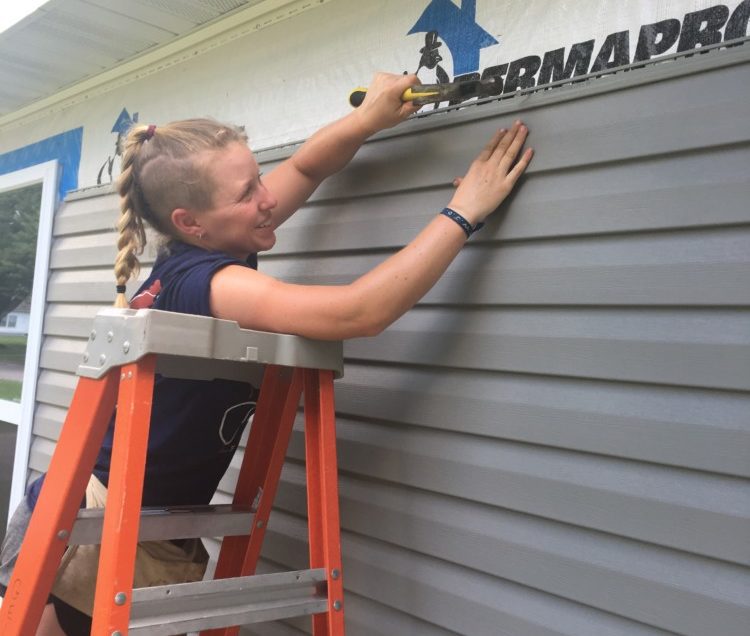Clemson — According to a 2019 report by the National Low Income Housing Coalition, the average two-bedroom apartment is unaffordable to minimum wage earners. A low-income worker would need more than three full-time jobs to pay their rent without a roommate and would need to work an average of 52 hours per week.
Frances Schueren, a junior Food Science and Technology student from Philadelphia with an emphasis on sustainability, did not know much about the affordable housing crisis before last May, but she came to know the faces behind the crisis by joining Bike & Build, a fundraising organization that meets cross-country cycling with affordable housing construction.

Schueren joined Bike & Build in 2019 for a summer of cycling along their Central US route, which stretches from Yorktown, VA to Portland, OR. She found out about Bike & Build from a friend while they were weighing the prospect of joining the Peace Corps. Her friend knew how passionate Schueren was about service and decided this was right up her alley.
“I started bouncing the idea off people, being like, ‘Hey, I think I might ride my bike across the country,’” Schueren said. “And I got some very mixed results. But then I was like, I’m just going to do it.”
Bike & Build is a nonprofit organization that raises money for affordable housing grants to other nonprofits and recruits young volunteers to do service in low-income communities. Each summer, the program enlists four teams of cyclists who stop about every fifth day to swap handlebars for hammers and build for organizations like Habitat for Humanity.
Altogether, Schueren’s team raised $160,000 in donations, 100 percent of which went toward affordable housing grants or trip expenses. Most of the grant money goes toward the organization’s competitive grant program, while the rest is distributed between “On the Road” grants, which permit the team’s overnight hosts to grant an amount of the proceeds to organizations of their choice; and “Rider” grants, which permit the riders to do the same.
Schueren and her team of 30 cyclists covered a lot of ground in three months. They rode a total of 4,019 miles, averaging about 70 miles a day. Some days they rode as little as 40 miles and others as much as 100.
One of the pledges the cyclists must make is to complete one rain ride, but Schueren’s team rode for seven straight days in the rain once they hit Kentucky, making for a grueling week of pedaling.

The terrain was no more hospitable than the weather. The rural Appalachian Mountains proved especially difficult since the roads were ungraded and very steep in places. No one expected them to be as hard as they were, Schueren said.
The mountains of Colorado proved especially difficult. At an elevation of about 11,500 feet above sea level, the team made its crossing at Hoosier Pass, near Breckenridge. The temperature was around 35 degrees.
“You’re trying your hardest, but the oxygen is thinner and you just can’t work as hard,” she said. “That was definitely physically difficult.”
Yet Schueren also found reward in the experience of cycling to a new town and meeting its residents.
“It was challenging learning how to adapt to being in a new town every night and realizing how much I didn’t know about the country and how much I had to learn. Once I settled into that, it made things a lot more fun and more rewarding than challenging,” she said.
Schueren and her team also participated in what were called Affordable Housing Days, where they would stop for a day to connect with the community and learn about local housing issues. Schueren’s team once met with the Portland Housing Bureau to discuss solutions to Portland’s housing crisis and offer feedback.
“For almost every single town we went to, we had the opportunity to talk with the people that lived there and get their perspective on what housing looks like in that area and how advocating for better things in their town could help them,” Schueren said. “It gives you a whole new perspective on what people in America are like.”
Schueren wants to work with food systems after she graduates and has considered working for nonprofits connected to food access, equity, and sustainability. She was shocked to find that less than half of the communities she visited on her trip lacked a central grocery store.
“People think that’s normal and it shouldn’t be,” she said. “They don’t have produce and they don’t have fresh items.”
Bike & Build exposed Schueren to uncomfortable truths about affordable housing in America, but it also exposed her to the personal hardships of low-income families.
She remembered visiting a local resident’s house for water and found the house unfloored, un-airconditioned, and swarming with flies.
“The inside was the most terrible living conditions I’ve ever seen,” she said.
She said the three boys who invited her and her team members inside were covered in bug bites. One of the kids, nine, “was very clearly malnourished.”
“Kids should not grow up thinking that is normal,” Schueren said. “That kid wasn’t ashamed of what he was showing me. He thought that was normal and that’s probably what his friends’ houses look like. It was crushing to me… I was like, what are those kids going to eat for dinner? What are their parents doing?”
Schueren said she wants to one day lead the Southern US route that runs from Jacksonville to Santa Barbara, where she can participate in Katrina repairs in Louisiana, which has appealed to Schueren’s appetite for meaningful service.
Non-participants can get involved by supporting a rider and donating money to their campaign. A cyclist needs to have raised $5,000 by the start date to participate on in one of the trips.
Get in touch and we will connect you with the author or another expert.
Or email us at news@clemson.edu

